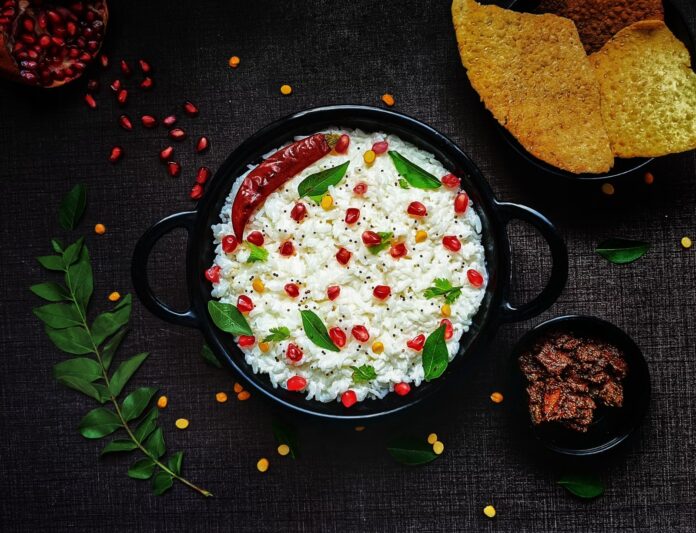In our Indian culture, we believe – and rightfully so – in the philosophy “that food serves as medicine”. This belief is deeply rooted in our Hindu tradition which suggests that certain dietary practices can not only nourish our body but also heal and balance it.
The Science Behind Curd Rice
One of the examples of this philosophy is the traditional Indian dish of curd rice, known for its unique ability to release tryptophan in the brain. Tryptophan is an essential amino acid that plays a vital role in producing serotonin, a neurotransmitter associated with feelings of well being and happiness.
When we eat curd rice, it facilitates the release of tryptophan, which travels to the brain and cultivates a sense of calmness in our mind. Additionally, this process aids in the relaxation and rejuvenation of neurons, recharging the brain’s functioning. What sets Indian dietary practices apart, especially in the context of curd consumption, is the preference for consuming curd in its natural form.
Unlike the Western world, where yogurt is often consumed with added sugars, we Indians prefer the natural, unsweetened version of curd. This distinction is crucial as the addition of sugar can disrupt neural activity thus leading to hyperactivity and an imbalance in neural functions.
The term “tryptophan” originated from the Sanskrit word “Trupti,” which means satisfaction or contentment. This endorses the intrinsic nature of curd rice as a brain food, providing a sense of satisfaction and well being.
Furthermore, in the warm climates prevalent in India, curd rice serves as an excellent food choice for maintaining brain health and activity. Its cooling effect is particularly beneficial in hot weather, helping to keep the brain functioning to the fullest.
However, the concept of food as medicine is not just unique to Indian culture. It is now a universal principle that the modern science is beginning to acknowledge and explore more deeply. Nutritional psychiatry, for instance, is an emerging field that examines the impact of diet on mental health.
Several studies have shown that diets rich in antioxidants, vitamins, minerals, and omega-3 fatty acids can significantly reduce the risk of depression and cognitive decline. Moreover, the gut-brain axis, a complex communication network linking the gastrointestinal tract and the brain, highlights the significance of gut health on mental well being.
Foods that promote a healthy gut microbiome, such as those rich in fiber and probiotics, can influence brain health, underscoring the holistic nature of the food-medicine continuum.
10 Amazing Health Benefits Of Curd Rice
We must consider this entry of summer season into India now as a call to include curd rice in our daily food. You may ask, “what will happen if we don’t eat curd rice..??”. I may not be able to give you the exact answer, but I can certainly tell you what benefits it offers if we consume it everyday more particularly during this summer. Here are those benefits.
1. Digestive Health: Curd rice is easy on the stomach and aids in digestion due to the presence of probiotics in curd. These beneficial bacteria enhance gut health, promote regular bowel movements, and prevent digestive disorders like bloating and constipation.
2. Cooling Effect: Consuming curd rice has a cooling effect on the body, making it an ideal dish not only for the hot summer but also for the humid climate prevalent all through the year in many parts of India. Curd helps in maintaining the body’s internal temperature.
3. Boosts Immunity: The probiotics in curd strengthen our immune system. Regular consumption of curd rice can help our body fight off infections more efficiently by enhancing the body’s natural defense mechanisms.
4. Nutrient Rich: Curd rice is a good source of calcium, which is essential for strong bones and teeth. It also contains other vital nutrients like B vitamins, potassium, and magnesium, contributing to overall health and well being.
5. Promotes Heart Health: The inclusion of curd in our daily meals helps in maintaining heart health by managing cholesterol levels and reducing high blood pressure, thanks to its potassium content.
6. Calming for the Brain: Tryptophan, the amino acid present in curd, promotes serotonin production in the brain. This “feel-good” neurotransmitter helps in calming the mind and improving mood thus making curd rice a brain friendly food.
7. Good for Lactose Intolerants: Many people who are lactose intolerant find it easier to digest curd compared to milk. The fermentation process reduces the lactose content, making curd rice a suitable dairy option for those with lactose sensitivity.
8. Weight Management: Being rich in calcium, curd rice can aid in weight loss and weight management. Calcium helps in breaking down body fat and, when combined with physical activity, can lead to healthy weight management.
9. Enhances Skin Health: The vitamins and minerals in curd rice can contribute to healthy, glowing skin. The antioxidants present help combat free radicals, reducing signs of aging and improving skin texture.
10. Muscle Health and Recovery: For those engaged in physical activities or workouts, curd rice can be an excellent post exercise meal. It provides the necessary proteins for muscle repair and recovery, while the carbohydrates in rice help replenish energy stores.
Conclusion
Indian’s belief in food as medicine, exemplified by the dietary practice of consuming curd rice, finds validation in contemporary scientific research as well. Keeping all the notions aside, start including curd rice in your daily meals – if you are not already doing it – and reap all the above mentioned benefits. It helps not only you but also your family.
Much love
